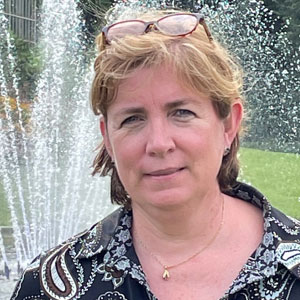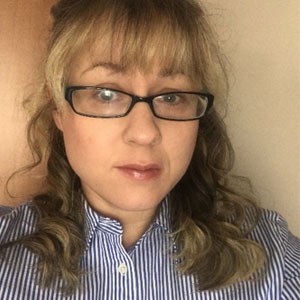Veerle Vuylsteke

Nurse for 30 years in various disciplines (emergency, operating theatre, intensive care, cardiology) and about 8 years head of department in cardiology. For the last 5 years she has been the supporting nurse for the department of urology and gynaecology, namely the ambulatory hysteroscopy with both Dr. De Vree and Dr. Maryns at the ZNA Middelheim in Antwerp, Belgium.
Inspired by Dr. De Vree’s trust and belief in the nursing department for hysteroscopy and laparoscopic gynaecological operations, we wanted to take matters into our own hands together to further explain the nursing framework for the examinations and operations and share our experience in this regard.
What is important to us?
We want to show how the triangular relationship works between doctor, patient, and nurse, before, during and after treatment (hysteroscopy, operative treatment). And the role of the nurse!
How do we arrive at an ideal collaboration so that we can treat / operate on the patient in such a quantitative and qualitative way? Working together means with the necessary respect, the possibility of discussion, thinking about future-oriented expansion and framework of research, changes, possibilities to follow further training, …
Discovering the differences in relation to the operation, cooperation, way of thinking, …
In the different countries and continents.
The differences in legislation: I found that the differences between Great Britain and Belgium are enormous.
We want to inspire nurses to participate, to think along, to give further training, to share their abilities with doctors and nurses.
Caroline Bell Nurse hysteroscopist UK

I am based in Cumbria, England. I have undertaken post graduate hysteroscopy and colposcopy. I have my own nurse led clinics in colposcopy, one stop post-menopausal bleeding and nurse led oncology. Currently I have a chair position on the British society of gynaecology endoscopy, representing my nurse hysteroscopy colleagues within the United Kingdom. Regularly I am part of the faculty at the Royal College of gynaecology and obstetrics teaching on the hysteroscopy workshops for trainee doctors. I also attend the University of Bradford annually to meet and present to the nurse intake of nurse hysteroscopists.
Nurse Hysteroscopy within the United Kingdom
The United Kingdom has a nurse hysteroscopy training package. The government supports and encourages nurses in advanced practice within the National health-service. A team in Bradford developed an advanced practice module in hysteroscopy to train nurses at an advanced level to practice hysteroscopy/one stop clinics independently (UKCC 1992)
This has benefits for patients including:
- Treatment is provided by all-female team, important to some population whose religious beliefs require this
- Permanent staff, because of the rotation of doctors, their experience in hysteroscopy and the treatment may be limited
- Nurse hysteroscopists perform hysteroscopy daily and become very skilled
More recently The University of Bradford and Caroline Bell have supported a team in New Zealand to set up a similar course.
My Experience:
I was working within gynaecology seeing ladies who attended with post-menopausal bleeding, some of these ladies needed hysteroscopy, this could not be offered on the day and the patients had to return 6 weeks later for a diagnostic test.
Watching hysteroscopy I felt it was a procedure I could undertake, the consultant I was working with Mr Oudai Ali suggested I undertake the training.
The training consisted of a logbook of up to 150 cases and a Masters module at university (including case studies, audit MCQ exam and OSCE)
Once I felt competent I was able to set up a one stop clinic so ladies could have the hysteroscopy at their first appointment.
This UK model is proving to be very successful, with highly trained hysteroscopists performing operative procedures. The Royal college of Obstetricians and gynaecologists now asks some of the experienced nurse hysteroscopists to teach the doctors on their workshops.
Caroline hopes this model can be adapted in many other countries, she is willing to help this happen, if you would like to contact her please get in touch with the ISGE secretary.